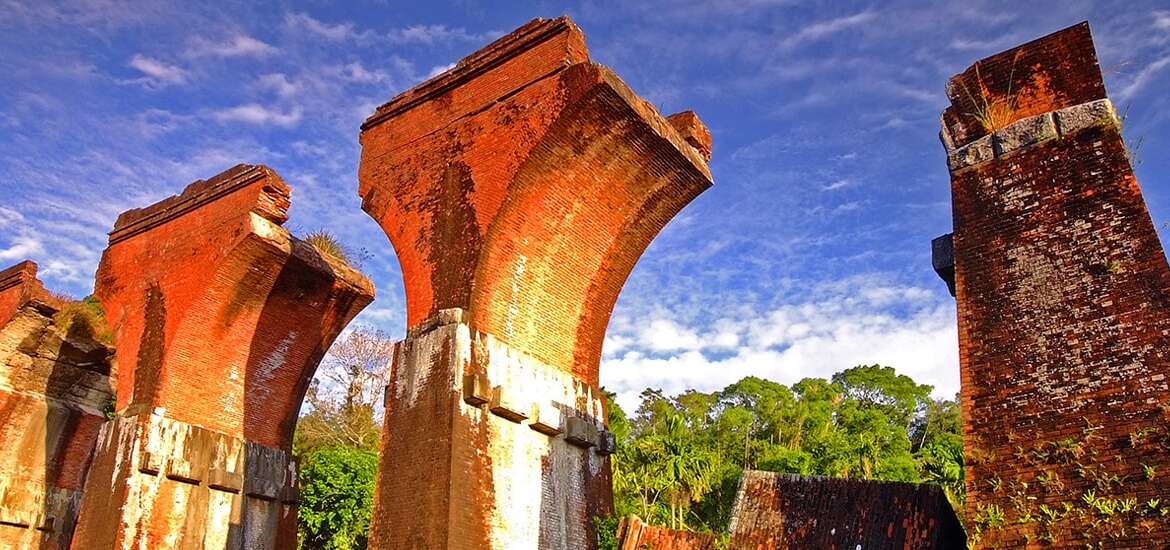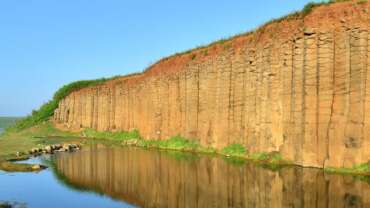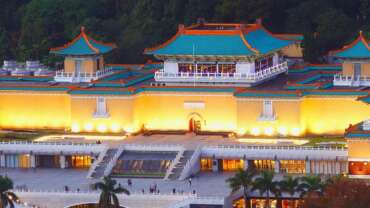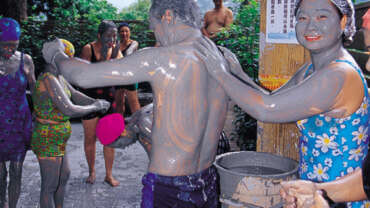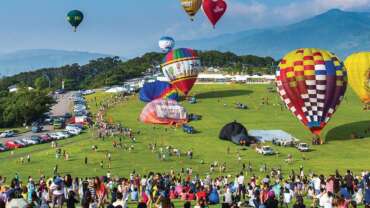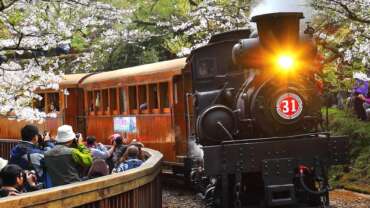Central Taiwan
“Central Taiwan” refers to the following five counties and cities: Miaoli County, Taichung City, Changhua County, Nantou County, and Yunlin County. Located at the heart of Taiwan, these places are ideal for travel as the climate is mild. Many holiday villages and theme parks suitable for young and old can also be found here. If you like culture and art, you must not miss the wood carving studios and pottery kilns in Miaoli, where DIY classes are available. National Taiwan Museum of Fine Arts and National Museum of Natural Science are worth some close explorations. Yunlin is known to the world as the place of origin of puppet theatre. It is also worth some fine appreciation.
Miaoli County
The main attraction in Miaoli is Shitoushan, or Lion’s Head Mountain. This isn’t one of the oldest temples on the island, but it is said to be very nice, and an interesting place to spend some restful days and nights.
Located between Hsinchu and Taichung counties, Miaoli is one of the best travel and vacation spots in western Taiwan. The county attracts over 6.5 million local and international tourism visitors every year with the help of its pleasing climate, convenient transportation, and six major attractions: the tung blossoms, wood sculpture, hot springs, fruit, ceramics, and Hakka food. Visitors will want to arrange a three-day stay to take it all in.
Each year in April and May, Miaoli turns into a beautiful sea of tung blossoms. These snow-white blooms blanket entire mountainsides and reflect the tranquility of the county lakes. Every year they attract throngs of visitors with their seasonal cheer, much like the cherry blossoms in Japan.
There are five major tourism areas in Miaoli, including: the Sanyi Wood Sculpture and Old Mountain Line Tourism Area, Dahu Strawberry Culture Park, Taian Hot Spring Scenic Area, Mingde Reservoir Scenic Area, and Nanzhuang Lion’s Head Mountain Scenic Area. At all of these sites, visitors can also enjoy the local Hakka cuisine, aboriginal culture, recreational farms, coastal recreation, and festival activities.
Taichung City
Taiwan’s second largest city; Taichung enjoys a mild year-round climate with an average temperature of 22.4 degrees centigrade. It also has a highly developed industrial and commercial base, thriving cultural scene, friendly people, and beautiful scenery, all of which contribute to its status as an international-class city. Centrally located in the western half of Taiwan, Taichung welcomes visitors with a pleasant climate throughout the year. The city first rose as a major political, economic, transportation, and cultural hub during the Japanese occupation period, due highway, railway and shipping port development during that time.
Through dedicated preservation efforts, Taichung has saved many of the city’s historic sites and retains the original “chessboard” street plan from the Japanese era. Among the many sites of interest in the city are the 200-year-old Lecheng Temple, the ornate and much-visited Chenghuang Temple, and the three-hall style Wanhe Temple. The Chang Liao Family Shrine as well as the 200-plus-year-old Zhenlan Temple in Dajia further add to Taichung’s yesteryear charms.
In addition to historic attractions, Taichung also offers plenty to satisfy one’s thirst for the arts, culture and learning, including the National Taiwan Museum of Fine Arts, and Taichung City Cultural Affairs Bureau.
There are also a number of department stores and distinctive shopping areas and boutiques. The European-style Jingming Shopping District and Fenglin Restaurant at the Art Garden impart Taichung with a fashionable elegance that recalls the Champs Elysees in Paris.
Changhua County
Changhua is known as “the granary of Taiwan.” Surrounded by mountains to the north, south, and east, the city faces the Taiwan Straits to the west.
The flat and fertile land of Changhua has earned this county a reputation as the breadbasket of Taiwan. Known originally as ‘Banxian,’ this area was one of the first to be developed in Taiwan. During the Qing period, Lugang in Changhua grew to become the main city in central Taiwan, leading to the saying: “first Tainan, second Lugang, third Taipei’s Mengjia (Wanhua) district.”
Today, Changhua invites visitors with an abundance of tourism resources. The Bagua Mountain Range is a rising star on Taiwan’s tourism map, offering a perfect spot for hiking, fitness walks, bicycling, and ecotourism. For cuisine, each region of Changhua serves up unique mouthwatering specialties: Taiwanese meatballs (Changhua and Beidou), mutton stewed with Chinese herbs (Xihu), sweetmeat (Yuanlin), oyster omelets and traditional cakes (Lukang), fried oysters (Wanggong), herbal cuisine (Tianwei), and fire stir-fried noodles (Ershui). Changhua is also a great spot to enjoy a leisurely vacation in the country, with many of the county’s farms open for recreation. The local orchards produce some of Taiwan’s best fruit, including carambola (in Yuanlin Township), litchis (Fenyuan), grapes (Dacun and Xihu), guava (Shetou), and watermelon (Dacheng).
Changhua was settled largely by immigrants from the Chinese provinces of Fujian and Guangdong. These settlers brought with them their unique customs and culture, evident today in the many colorful historic sites found throughout the county. These include: Changhua’s landmark Baguashan Great Buddha; Longshan Temple, a national historic site known as “Taiwan’s Forbidden City”; Tianhou Temple, a national historic site dedicated to Meizhou’s Mazu; and Baozang Temple, Qingshui Temple, and Hushan Temple. All open a fascinating window to Taiwan’s history.
Nantou County
Nantou County lies at the geographical heart of Taiwan and is the only county that does not border the coast. If the central region is the heartland of Taiwan, Nantou is Taiwan’s heart: it is the only landlocked county on the island!
Nantou County occupies an area of about 4,100 square kilometers. It is home to Taiwan’s highest peak, Yushan (Mt. Jade), and 41 other 3,000-plus-meter mountains that form an unbroken and undulating expanse of green. Taiwan’s longest river, the Zhuoshui River, winds through the county, and the island’s most beautiful lake, Sun Moon Lake, completes the county’s scenic tapestry.
Nantou is heavily dependent on farming. Rustic areas and an abundance of agricultural products are therefore among the county’s major visitor draws. There are dozens of well-planned recreational farm areas that are perfect for a quiet and leisurely family trip to the countryside.
Accommodation choices range from world-class resort hotels to rural B&Bs. Whether you choose to stay at an exotic villa at Qingjing Farm or an elegant room at Puli Tao-Mi Eco-Village, you are never far from nature’s scenic embrace.
Visitors can discover the beauty of Nantou along the seven main travel routes in the county. Enjoy a spring excursion to the outskirts, a cool summer escape, the starry nights of fall, or a winter hot spring soak and fun in the snow. Whenever and wherever you arrive, Nantou is there to welcome you on a relaxing, fun, and eye-opening journey.
Yunlin County
Located at the central-south part along the western coast of Taiwan, Yunlin County stands at the north tip of Jianan plain, bordering Nantou County in the east, Changhua County in north with Zhoushui River as watershed, Chiayi County in the south with Beigang River as watershed.
Yunlin is located in the south-central part of western Taiwan at the northern end of the Jianan Plain. Nantou County lies to the east and the Taiwan Strait to the west, the Beigang River and Chiayi County define the southern border, with the Zhuoshui River and Changhua County to the north. Plains account for nine-tenths of the county area, while mountainous areas make up the remaining 10 percent. The county has a subtropical climate and a year-round average temperature of 22.6 degrees centigrade. Administratively, it is divided into 20 townships and cities, all in flatland areas except for the three mountainous areas of Douliu City, Gukeng Township, and Linnei Township.
As a county built on agriculture, Yunlin has long taken pride in its rustic charm and high-quality agricultural products. Among the local specialty goods here are coffee (Gukeng Township), hard clams (Taixi Township), horseshoe clams and Taiwan tilapia (Kouhu Township), shaddock (Douliu Township), soy sauce (Xiluo Township), pickled cabbage (Dapi Township), and peanuts and sesame oil (Beigang Township). Each of these items captures the authentic local flavors of Yunlin and makes a perfect souvenir gift for home. In addition, Yunlin’s many temples (there are more here than anywhere else in Taiwan!) attract tens of thousands of people every year. Yunlin has also nurtured a vibrant cultural industry. The county is the birthplace and a well-known capital of Taiwanese puppet theater.



